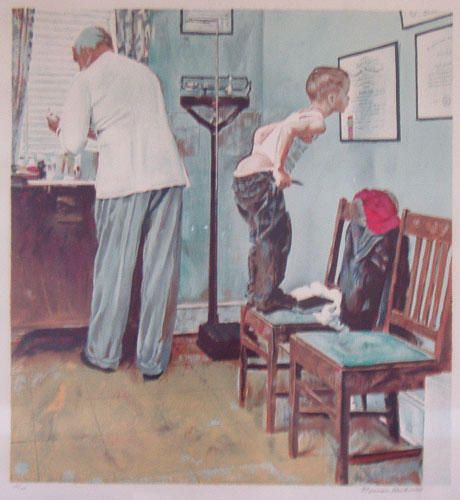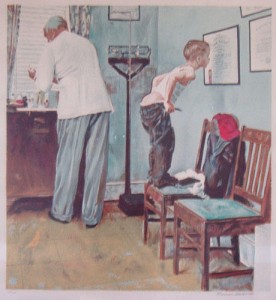The roles of patient and doctor are well defined to say the least. The doctor has a wall full of degrees and diplomas which establish him as the all knowing expert. He has thousands of hours in training and experience in applying the forces of pharmaceuticals and surgeries to combat disease. Perhaps he’s even done a round of volunteer work curing the poor helpless souls in some faraway land of their ills. And there you stand, the helpless patient. You can’t choose to stop having strep throat, diabetes, cancer, or whatever it is that ails you. As the patient, you are the passive party in the relationship, you are the one who needs some outside force to fix you – the doctor (or any medical professional) has the forces at his disposal to fix you.
This is great when it comes down to such things as bacterial infections, broken limbs, and various disease. With such conditions, an outside force is the only thing which will help the situation – the doctor has the solution, so it only makes sense that the patient would be passive, sitting by while the medical treatment works its magic to cure you.
The situation is quite different for problems of a behavioral nature though. With such problems, it just doesn’t pay to be a passive powerless patient, dependent on an outside force to cure the problem. Since the problem is one of choices, then taking on the passive role of a patient can be downright counterproductive. Habits take personal effort to change – effort that no one can exert for you.
I have offered up the opinion on this site, that addiction is a choice. What’s more, I’m not the first to do so, many extremely thorough and rigorous researchers and theoreticians have posited, and I believe proven, the same (see Peele, Schaler, Heyman, Fingarette, or Baldwin Research Institute). If addiction is a choice rather than a disease – then the role of “patient is actually the worst position that a person with a substance use problem could ever take on. While they could be making bold new choices, cementing new habits, and making effective change in their lives – instead they wait for a cure which will never come. Or worse, they keep investing their faith in treatment programs only to end up falling flat on their face and becoming more hopeless than they were to begin with.
The disease theory of addiction places people in the patient role. It teaches them that they are powerless to control their own behavior, and must rely on some outside force to change the behavior (or cure the disease as it were). The same applies for any program which characterizes addiction as an “allergy”, genetic condition, or otherwise attributes addiction to biological forces beyond volitional control (such as those who suggest that toxins or nutritional deficiencies are the culprit). Moreover, any program for addiction which employs medical personnel such as doctors, nurses, psychiatrists, or various forms of psychologists does the same harm of placing the troubled person into the powerless patient role. Any program labelled as “treatment” (which suggests a medical process of some kind) does the same as well. The patient role is what every “addicted” person must escape if they want to permanently solve their problem – and it can’t be escaped through further treatment – this can only compound the problem – it can only be escaped through knowledge, reason, and confidence in one’s judgment.
It has often been suggested that teaching and supporting the disease view is a kind act – whether or not it’s truly a disease. I disagree, I think it’s oppressive. I believe that knowledge is power. True knowledge can empower people to be effective and successful in life, and false knowledge can cause failure and lead people to feel powerless, helpless, and impotent. The diseasers are imparting falsehoods, they’re convincing people to feel helpless, and pigeonholing them into the passive patient role, waiting for a miracle while life passes them by.
To empower yourself to change, learn the truth about addiction, then explore your options for new activities, beliefs, thoughts, and lifestyles that will bring you more happiness than the object of your addiction.
NOTE:
Withdrawal and detoxification are separate issues from what we know of (and what I refer to above) as addiction. If you are feeling dangerous effects of withdrawal from alcohol or prescription drugs, you should certainly see a qualified doctor for these issues, as the failure to do so can be fatal. It is proper to be in the patient role for that problem, and the medical establishment does have good solutions for this aspect of some people’s substance use problems. But for the wider problem of addiction – the medical world has failed miserably.


“Doctor” + “Patient” (should always) = collaboration :0)